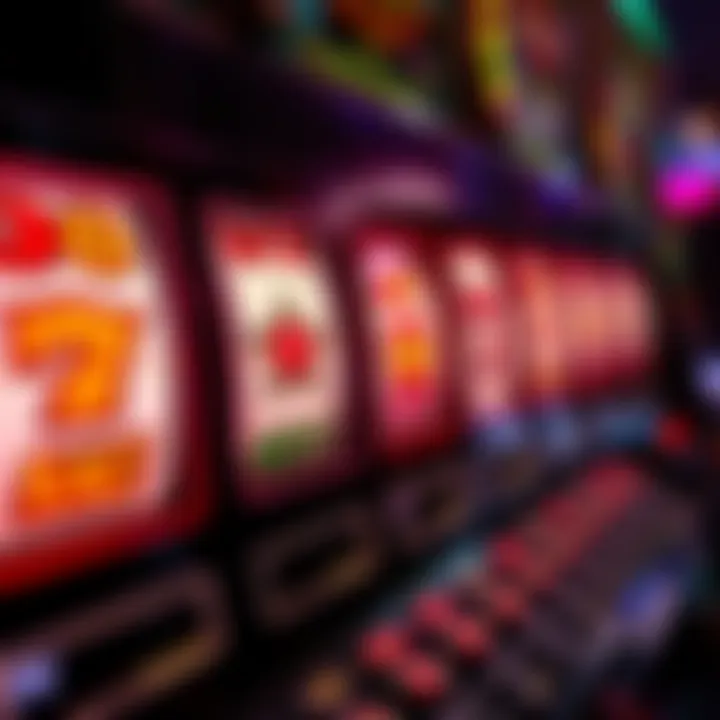Maximizing Your Odds on Casino Slot Machines


Intro
Navigating the vibrant world of casino slot machines can feel like walking a tightrope. Every spin holds the potential for a rewarding win or a disappointing loss. This article aims to shed light on how to gain an edge while playing these popular games. Understanding optimal odds, return-to-player percentages, and various gameplay methods is key to improving your overall experience.
Casino slot machines are not just about luck; there's an undeniable layer of math and strategy involved. By equipping yourself with the right knowledge, you can turn a casual gaming session into an opportunity for more favorable outcomes.
Game Strategies
Strategy Basics
To start, it's crucial to understand the fundamental approaches that can help players maximize their odds when engaging with slot machines. One important aspect to consider is choosing games with higher Return to Player (RTP) percentages. RTP is the percentage of wagered money that a slot machine returns to players over time. For instance, a machine with an RTP of 95% typically means that for every $100 wagered, $95 is returned in some form—from bonuses, jackpots, or payouts.
Additionally, understanding the volatility of a machine can influence your strategy. High volatility slots tend to pay out larger amounts but less frequently, while low volatility slots offer smaller, more consistent payouts. Depending on whether you prefer fewer risks or the chance for bigger wins, selecting a machine that aligns with your gaming style is essential.
Advanced Techniques
Once you've grasped the basics, you might want to dive into more advanced techniques. One such method involves utilizing betting patterns. Players have found success by varying their bet sizes strategically. For instance, starting off with smaller bets allows for a more extended gameplay session and the opportunity to observe the machine's behavior. Once you've gauged a pattern, increasing your bet may yield better returns during a machine's active periods.
Additionally, practicing good bankroll management is paramount. Setting a strict limit on how much you’re willing to spend and sticking to it can help maintain a balanced approach to gaming. This not only enhances your experience but also reduces the chances of pursuing losses, which can lead to harmful habits.
"Smart players stay aware of what they can afford and play within those limits. It’s the path to a more enjoyable experience, free from unnecessary stress."
Responsible Gambling
Recognizing Gaming Limits
While strategies can improve your odds, responsible gambling should always remain a top priority. Knowing your limits and recognizing when to step back is crucial in every gaming environment. Set time limits for your gaming sessions and adhere to them strictly. This helps maintain a clear perspective on your gameplay and budget.
Resources for Support
Should you find yourself or someone you know facing challenges with gambling, various resources are available. Organizations like the National Council on Problem Gambling (www.ncpgambling.org) provide assistance and support to those in need. Familiarizing yourself with available options can equip you with tools for healthier gambling practices.
Understanding Casino Slot Machines
When diving into the world of casino slot machines, it’s essential to grasp the foundational elements that shape this segment of gaming. Understanding the mechanics, history, and variations of slot machines can set the stage for more informed decisions as you navigate these vibrant and often flashy games. Knowing how these machines operate not only enhances your gaming experience but also empowers you to recognize which machines offer better odds. This knowledge can ultimately help you make more strategic choices, amplifying your chances of hitting it big.
Historical Overview of Slot Machines
Slot machines first made their appearance in the late 19th century when Charles Fey created the Liberty Bell in 1895. This was the prototype that birthed a rich lineage of gaming machines, laying the foundation for what we see today. The early models had three reels and used playing card symbols, which were straightforward but exciting for the players of that era. As time rolled on, these machines evolved with advances in technology. The introduction of electronic slots in the 1960s marked a significant turning point, leading to intricate designs and gameplay mechanics that catered to a broader audience. Nowadays, slot machines are not just machines; they are immersive experiences that can transport players into different worlds, complete with engaging storylines and stunning graphics.
How Slot Machines Work
Understanding how slot machines function really boils down to grasping the Random Number Generator (RNG) technology that lies at their core. Each time you press the button or pull the lever, an RNG generates a sequence of numbers, determining the outcome almost instantaneously. This process is crucial since it ensures that every spin is fair and unpredictable, giving no edge to the player or the casino. A basic grasp of this can provide players with clearer insight into why hitting that jackpot sometimes feels more elusive than catching a fish with your bare hands. Beyond that, players should also know that the software that powers these machines meets stringent regulations, adding a layer of credibility and safety to the game.
Types of Slot Machines
Slots have diversified tremendously since their inception, and players are now faced with a variety of choices, each offering unique gameplay and experiences.
Classic Slots
Classic slots are the original type of slot machines, often featuring three reels and a limited number of pay lines, typically one to five. These machines carry a sense of nostalgia, harking back to the days of the traditional fruit machines. Players fond of simplicity and straightforward gameplay often gravitate toward classic slots. Their key characteristic is the absence of complicated bonus rounds or multi-line betting options, making them appealing for newcomers or those seeking a no-frills gambling experience. While they might not offer the high payouts found in flashy video slots, their charm lies in providing a taste of the original slot-playing experience, which can sometimes lead to a satisfying win, albeit not often as monumental.
Video Slots
Video slots have taken over the slot machine realm by introducing immersive graphics and complex features. With multiple reels, numerous pay lines, and interactive bonus games, video slots are a feast for the senses. They often feature engaging themes, advanced sound effects, and animations that increase the entertainment value. A key feature of these machines is their high variance and potential for substantial payouts during bonus rounds. However, their downside can be the psychological aspect of heightened expectations, which sometimes leads players to spend more than intended, hoping for the engaging features to pay off.
Progressive Jackpot Slots
Progressive jackpot slots are known for their life-changing payouts. A portion of each wager contributes to a growing jackpot that can reach staggering amounts. These machines might be part of a network, linking multiple establishments, which allows the jackpots to grow at a rapid pace. The thrill of potentially winning a small fortune adds an electrifying twist to gameplay. However, the allure of these slots might come with a catch: they often have lower RTP percentages compared to standard slots. Players should be mindful and weigh the excitement of chasing a big win against the odds of a more modest return on their investment.
3D Slots
3D slots bring a unique element to the gaming experience by offering cutting-edge graphics and storytelling. These visually stunning machines captivate players not just by how they look but by how they play. A common characteristic is the inclusion of animated characters and intricate storylines that unfold throughout gameplay. This depth can create an engaging atmosphere; however, players might find the complexity and features overwhelming, particularly if they are new to slots. It’s crucial to balance the visually appealing aspects with gameplay functionality, ensuring that the excitement aligns with your personal gaming style.


Defining Optimal Odds
Understanding optimal odds in slot machines is critical for any player hoping to make the most of their gaming experience. Optimal odds essentially mean the chances or probabilities that determine how much a player can win relative to what they wager. It’s not just about luck; knowing these odds can empower players to make informed decisions and potentially maximize their returns. This section will shed light on important concepts essential for grasping optimal odds and the wider implications of these factors.
What Are Slot Machine Odds?
Slot machine odds refer to the likelihood of winning on a particular machine. Each slot machine operates on a Random Number Generator system, ensuring outcomes are random. However, the odds aren't designed in players’ favor. The odds can differ dramatically between machines. For instance, a classic three-reel slot might have better odds than a flashy multi-line video slot filled with extras. Generally, the higher number of variables or paylines, the more complex the odds become.
To highlight the variance:
- Classic slots often present a payout of 90% to 97%.
- Video slots can range significantly, with some offering as low as 85% to over 98%.
Understanding these odds allows players to make wise choices about where to invest their money. Always remember, it’s crucial to look at the specific odds of the slot you’re approaching rather than assuming all machines are created equal. This understanding can reshape your entire gaming strategy.
Return to Player (RTP) Explained
The Return to Player percentage is a key indicator of a slot machine's profitability for players over time. Essentially, it represents the expected payout percentage of the money wagered. For example, if a slot machine has an RTP of 95%, it means that over the long term, players can expect to get back $95 for every $100 wagered.
It's important to keep in mind:
- RTP is calculated over a vast number of spins, thus can vary in short-term gameplay.
- A higher RTP is more favorable, but it doesn’t guarantee immediate winnings.
RTP values vary between games and platforms. Online slots generally boast higher RTPs than their land-based counterparts, sometimes due to reduced operating costs. Knowledge of RTP helps you prioritize which machines and games to pursue during your next gaming adventure.
House Edge Phenomenon
Understanding the house edge is as critical as grasping RTP. The house edge represents the casino's advantage over time for any given game. For example, if a slot machine has a house edge of 5%, it means the casino expects to keep 5% of all wagers made on that machine.
This leads to a few noteworthy considerations:
- The house edge varies widely across different games and even within slot machines.
- Lower house edges are favorable for players, increasing the chances of retaining wagers.
For an astute gambler, recognizing the house edge can help determine which machines provide a better chance of winning, guiding players toward more rewarding experiences.
"Knowing the odds is the first step in making more strategic gambling decisions. Don’t leave it all to chance!"
Examining Payout Rates
Understanding payout rates is crucial for anyone hoping to play casino slot machines with some success. Payout rates, often expressed as a percentage, reflect how much money is returned to players over time compared to the total amount wagered. This concept, while simple in theory, can dramatically influence your overall gaming strategy. Without grasping the significance of payout rates, novice players might walk into a trap where they believe luck alone will dictate their outcomes.
When discussing payout rates, the two key terms that often arise are Return to Player (RTP) and volatility. Both these factors can dramatically transform the way you experience a slot machine. Understanding these components helps players position themselves in a more advantageous way, whether they're sitting at a noisy slot machine in Vegas or spinning reels online while lounging on the couch.
Evaluating payout rates requires a keen eye for detail; it’s not just about numbers on a screen. The implications of performing due diligence in this area can ultimately lead to a more prolonged and enjoyable entertainment experience.
"A thorough understanding of payout rates is like having a compass in the confusing landscape of slots; without it, you're just spinning your wheels."
Understanding Payout Percentages
When you hear someone talk about the payout percentage of a slot machine, they’re typically referring to the Return to Player (RTP) figure mentioned previously. This number is often advertised by manufacturers and offers an approximation of how often a player may expect to see their investment returned over thousands—sometimes millions—of spins. For instance, if a machine has an RTP of 96%, that generally means for every $100 wagered, $96 is paid out over extensive playtime.
However, it's essential to discern between short-term and long-term expectations. In the short term, anything can happen; you could hit a jackpot after just a few spins or experience a dry spell. But statistically, the longer you play, the more closely your results might align with the advertised RTP—provided you are, indeed, on a machine that accurately adheres to that percentage.
State Regulations and Their Impact
Payout percentages and overall slot machine operations can vary significantly based on regional regulations. Each state has its own rules governing how slot machines are designed, operated, and checked for fairness. For example, California may have different regulations compared to New Jersey, which can greatly affect the odds you see in a casino.
Many states enforce minimum payout percentages; in Nevada, for example, slot machines must have an RTP of at least 75%. Although this is quite low by industry standards, it emphasizes the need for players to check the regulations in their jurisdiction before diving into slot gaming. Some states regulate reporting requirements, where casinos are required to submit their machines' payout rates periodically, leading to better machine assessments on the casino floor.
In essence, understanding how state regulations shape payout rates can be an invaluable asset for players. With this information, it's possible to make more calculated decisions regarding which machines to approach and which to avoid, potentially maximizing your returns based on local laws. Players who do their homework will likely find that knowledge is not just power, but also money saved and potentially won.
Strategies for Identifying Best Odds
Understanding how to identify the best odds when it comes to slot machines isn't just a matter of luck; it’s a strategic endeavor that can significantly impact a player’s overall experience and financial outcomes. Focusing on this area can lead to smarter decisions, potentially enhancing the joy and thrill of playing. Here, players can navigate the often confusing landscape of slot machines with more clarity.


Researching Slot Machines
Before any spinning begins, research can pay considerable dividends. Players should take the time to explore various machines and their characteristics. It’s not only the flashy lights and enticing themes that should capture attention. A machine's Return to Player (RTP) percentage, volatility, and hit frequency are crucial metrics to grasp.
Among enthusiasts, online forums and user reviews — like those found on Reddit — can shed light on which machines have higher payback percentages. Knowledge is power here. Engaging with other players can help in highlighting which slots have yielded the best results.
Choosing Machines Based on RTP
Selecting machines based on their RTP is a tactic many players overlook. The RTP percentage gives insights into the machine’s long-term payback. Generally, a machine with an RTP of 95% or higher is considered good. However, it’s key to put that number in context—higher RTPs typically indicate better odds in the long run but don't guarantee immediate returns.
It's also wise to remember that different types of slots may exhibit varying RTP ranges. For instance, a classic slot may offer a different experience compared to a progressive one when it comes to odds and payouts. Understanding these nuances can keep player expectations realistic and enhance the strategic approach.
"A higher RTP doesn't always mean a more profitable experience. It's crucial to combine it with other factors like volatility for a holistic view."
The Role of Volatility and Variance
Volatility and variance significantly influence a player’s gaming strategy. Simply put, volatility refers to how often a machine pays out, and how sizeable those payouts are. High-volatility slots may churn out large wins but do so less frequently, while low-volatility machines offer smaller wins more often.
Recognizing personal risk tolerance is vital here. If one is more risk-averse, sticking to low-volatility slots can be prudent, ensuring more regular, albeit smaller, winnings. On the other hand, thrill-seekers may prefer the allure of high volatility, where the chance for substantial wins is higher, albeit with increased risk. Understanding this dynamic helps players calibrate their strategies to match their individual preferences and playing styles.
Utilizing Bankroll Management Techniques
Last but not least, effectively managing one's bankroll is essential for sustaining a strategy over time. This involves knowing how much one can afford to lose and setting limits accordingly. Some players might benefit from the 50/30/20 rule: 50% of their budget for playing, 30% for savings, and 20% for anything else.
Additionally, setting win and loss limits can facilitate a better gaming experience. Players should assess their performance periodically and adjust their bankroll management plans if necessary. This approach minimizes emotional decision-making while enhancing discipline, ultimately leading to a more enjoyable and sustainable gaming practice.
Evaluating Online vs. Land-Based Slot Machines
The landscape of gambling has shifted dramatically in recent years, primarily thanks to the rise of online platforms that offer a plethora of gaming options. Evaluating the differences between online and land-based slot machines is paramount for players seeking to optimize their betting experiences and outcomes. Understanding how these environments differ can influence player choices significantly.
Differences in Gameplay Experience
When we talk about the gameplay experience, there are marked distinctions between online and land-based slots. Land-based casinos present a vibrant atmosphere, filled with sounds of tapping buttons and cheers that can give you a real adrenaline rush. The social aspect of playing next to others at a machine, sharing wins or groans over losses, can’t be duplicated online. However, the tactile experience of pulling a lever or pressing a button on a physical machine is certainly a significant aspect of what keeps players engaged in a brick-and-mortar establishment.
On the flip side, online slots offer the advantage of convenience. Players can enjoy their favorite games in their pajamas or while sipping coffee at home. Websites and apps provide accessibility at any hour, allowing for gaming at your own pace. The sheer variety of games available online dwarfs that of traditional casinos. Players might find themselves lost in a digital labyrinth of themes, storylines, and features that simply do not exist in physical venues.
"In the endless debate of online vs. land-based slots, one must consider which form of convenience outweighs the social thrills."
Additionally, the technology behind online slots has improved dramatically. Many games come with mesmerizing graphics and animations, creating an immersive experience that might feel superior to older land-based machines. Yet, this very element can lead to distractions that some players might find discouraging. Concentration is key in making strategic bets, and sometimes the flashiness can override that.
RTP Variability in Different Platforms
Return to Player, or RTP, is an essential aspect that players should closely examine when evaluating slots. Traditionally, land-based slot machines usually have lower RTP rates compared to their online counterparts. A common range for brick-and-mortar slots might run between 75-90%, whereas online slots often feature RTPs as high as 95% or 96%.
The variance in RTP can be attributed to several factors:
- Operational Costs: Physical casinos have significant expenses like rent, employees, and maintenance, which can lead to lower payout percentages.
- Competition: Online platforms magnetize players with better RTP rates to retain their business as the market is highly competitive.
- Regulatory Standards: Depending on the jurisdiction, land-based casinos might have to adhere to specific limits that can affect their payout percentages.
As such, one must be cautious when evaluating slots, both online and in-person. Knowing that an online game might yield a better chance of winning in the long run can be a game-changer, helping to inform strategies and choices.
The Psychological Aspect of Slot Gaming
In the realm of casino gaming, the psychological aspects often get overlooked. It's easy to think of slot machines merely as machines with spinning reels and flashing lights. However, understanding the psychological element is crucial to comprehending why players place their bets and how they interact with the game itself. After all, it is the attraction to these machines that drives billions in revenue each year.
One significant element is the concept of player behavior, which looks into what motivates individuals to engage with slot machines. The thrill of winning, the experience of playing, and even the ambiance of a casino can deeply influence a player's choices. This engagement isn't just about luck; it encompasses expectation, perception of chance, and emotional responses that players have when they wager.
Understanding Player Behavior
Players often approach slot machines with various mindsets. Some might see it as a casual pastime, while for others, it becomes a serious venture to win big. Notably, cognitive biases play a role in how players evaluate their experiences.
- Illusion of control: Many players believe they can influence the outcome by manipulating how they play, even when slot machines operate purely on random number generators.
- Chasing losses: This is a common behavior where players continue to gamble to recoup losses, often leading to irrational decisions.
- Social acceptance: Being around fellow players can enhance the thrill, encouraging individuals to continue playing beyond their limit.
Understanding these behaviors is key—not only for the players hoping to refine their strategy but also for the developers keen on attracting and retaining players in a competitive environment.


Effects of Near Misses
One particularly interesting phenomenon in slot gaming is the concept of near misses. A near miss occurs when a player gets close to winning, such as landing two out of three symbols needed for a jackpot. This slight proximity can spark excitement and a feeling of almost triumph, potentially driving further play. It creates a psychological state where players believe they are close to winning, which can be misleading.
Research indicates that near misses can boost a player's emotional response, leading to an increase in play. This emotional draw can create a cycle of play, where the player believes they are close enough to justify the next wager.
"Near misses can evoke feelings of hope, which in turn can compel players to keep spinning those reels."
In sum, the psychological aspect is a vital part of understanding slot gaming. Whether analyzing player behavior or recognizing the impact of near misses, these insights are essential for anyone wanting to delve deeper into the gaming world. Not only do they highlight strategies players can use to manage their experience, but they also reveal the intricate design elements that developers employ to keep players engaged.
Legal Considerations for Slot Machines
When flicking the lever on a casino slot machine or tapping the screen on an online variant, few players consider the underlying legal frameworks that enable such entertainment. This section dives into the critical importance of legal considerations surrounding slot machines, encompassing licensing, regulation, and consumer protection laws. Recognizing these elements not only sheds light on the safety and integrity of gaming experiences but also equips gamblers with the knowledge necessary to make informed decisions.
Licensing and Regulation
Licenses serve as the bedrock of the casino industry, with local and national authorities imposing stringent criteria aimed at ensuring fair play and operational soundness. Without rigorous licensing, many of the protections offered to players would disappear. Essentially, licensing dictates which entities can legally operate slot machines, providing oversight that reinforces the credibility of the game.
In many jurisdictions, operators must undergo thorough background checks, ensure financial transparency, and adhere to set payout percentages that comply with established standards. This means that before a casino can set up shop or a gaming software can go live, they must show they meet the necessary legal stipulations. For example, in New Jersey, the Division of Gaming Enforcement governs online casinos and mandates adherence to transparency and fair play regulations.
It's worth noting that regulations can vary significantly from one region to another. While some states boast very progressive gaming laws allowing for high returns on investment (ROI), others may enforce harsher rules, impacting the level of engagement and trust players feel about different machines. Ensuring that you are playing in a licensed establishment not only protects your investments but also instills confidence that you are partaking in a lawful gaming experience.
The Benefits of Licensing
- Safety Assurance: Players can trust the machines are fair and adhere to rules.
- Compensation Safety: Should players encounter issues, licensing authorities often provide avenues for redress.
- Reputation Management: Licensed operators have a vested interest in maintaining high standards to keep their license.
Consumer Protection Laws
Consumer protection laws are another essential cog in the wheel that drives the gaming industry. These laws are designed to shield players from fraudulent practices, ensuring that they are treated fairly and can seek recourse if something goes awry. Understanding these laws is key, especially for those investing not just time but money into their gaming experiences.
For example, in the United Kingdom, the Gambling Commission enforces strict laws to protect gamblers from exploitation. They require casinos to display information clearly regarding the odds, payout rates, and the responsible gaming policies in place. This transparency is critical for consumers to gauge the risks associated with different machines.
Moreover, some consumer protection provisions ensure that operators can’t manipulate machines to unfairly increase profits at the expense of the player. In essence, these laws not only foster a better playing experience but also help maintain the integrity of the gambling environment.
"Consumer protection laws ensure that players can gamble without fear of deception or unfair play, reaping the benefits of a regulated market."
Potential risks remain in unregulated environments; however, being well-versed in your rights helps players safeguard their interests. Here are a few key aspects of consumer protection laws relevant to slot machines:
- Fair Play Regulations: Players have the right to fair gaming without dubious practices.
- Right to Information: Players can ask for precise information regarding their gaming experiences.
- Dispute Resolution: Clear protocols exist for addressing grievances, should issues arise.
In summary, understanding the legal landscape surrounding slot machines is crucial for players who aim to enjoy their gaming experiences while minimizing risks. The more informed the player, the better equipped they are to make decisions that can positively impact their gaming fate.
Concluding Thoughts on Slot Machine Odds
In the grand tapestry of casino gaming, slot machines occupy a unique and paradoxical space. They represent both chance and strategy, allure and risk. This exploration of optimal odds provides a crucial lens through which players can approach their gaming experience. Emphasizing the integration of knowledge, strategy, and understanding of mechanics fosters an environment where players can make more informed decisions, ultimately enhancing their gameplay.
The Significance of Understanding Slot Odds
When delving into the world of slot machines, grasping the concept of odds is paramount. Each machine operates under a distinct set of rules determined by its programmed Return to Player (RTP) and house edge. Knowing these factors allows players to differentiate between machines that offer a more favorable environment for potential success versus those that perpetually tilt the odds in the house's favor. Understanding these nuances isn’t just beneficial; it’s essential for making wise choices while playing.
"Knowledge is the key that opens the door to strategic gaming."
Practical Benefits of Strategic Play
Players who take the time to research and comprehend optimal odds gain several practical advantages:
- Enhanced Payout Expectations: By identifying machines with higher RTP, players can tailor their gaming choices toward maximizing returns.
- Informed Gameplay Decisions: Recognizing the volatility of machines can help players manage their bankroll more effectively and decide on the level of risk they are willing to undertake.
- Improved Entertainment Value: A strategic approach elevates the gaming experience from mere chance to one enriched with informed engagement and awareness.
Considerations Toward a Better Gaming Experience
However, strategy in slot gaming isn’t simply about understanding numbers and mechanics. It also encompasses emotional and psychological aspects. Players must consider their motivations and the potential for losses, acknowledging how these elements shape their gameplay.
- Preparedness for Losses: Accepting that loss is a part of gaming can cultivate a healthier mentality towards catapulting oneself into potential winning situations.
- Avoiding Pitfalls of Gambler's Fallacy: Being aware of psychological biases helps players stay grounded and rational in their decision-making.
In summary, concluding thoughts on slot machine odds reflect a deeper understanding of both strategy and emotional fortitude required for a favorable experience. Those who embark on their slot gaming journey with an arsenal of knowledge are far better positioned to unlock the potential rewards that lie within.
For those looking to deepen their understanding even further, consider exploring resources such as Wikipedia, Britannica, and engaging discussions on platforms like Reddit.
By leveraging this knowledge and reflecting on the essentials discussed, players can navigate the waters of slot gaming with greater confidence and insight.



